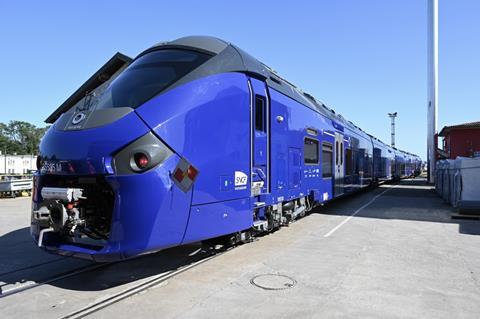
EUROPE: Passengers in France’s Grand Est région travelling to and from destinations in Germany will soon be riding on a fleet of 30 electro-diesel Régiolis TFA trainsets built specifically for cross-border services.
Unveiled on August 27 by regional President Franck Leroy and Transport Minister for Baden-Württemberg Winfried Hermann, the first four-car trainset emblazoned with images of the French and German flags had been assembled at the former De Dietrich Ferroviaire plant in Reichshoffen, now owned by Spanish company CAF.
The first four trains are due to enter service in October on domestic routes within France before they start cross-border operations next summer following certification by authorities in both countries. Operations will be governed by a protocol covering co-operation between the région and the Länder.
Routes earmarked for the Régiolis TFA fleet are Metz – Saarbrücken, Metz – Trier, Strasbourg – Saarbrücken, Strasbourg – Wörth am Rhein – Karlsruhe, Strasbourg – Neustadt an der Weinstrasse, Strasbourg – Offenburg and Mulhouse – Freiburg im Breisgau.
A Regiolis TFA pre-production prototype was first demonstrated to interested parties in July 2021. Designed to accept power at 15 kV 16∙7 Hz and 25 kV 50 Hz, the Coradia Polyvalent trainsets have a maximum speed of 160 km/h. Each set with 200 seats includes a 16-seat first class saloon and space for 18 cycles as well as toilets meeting PRM accessibility regulations.
Investment in the cross-border fleet amounts to €388m. Most of this was provided by the Grand Est région, but the Länder of Baden-Württemberg, Saarland and Rheinland-Pfalz contributed €20m. A further €6∙2m was made available from European sources under the Interreg programme.
There will be no need to change train crews at the border, Leroy announced at the event. ‘Every day German people come to work in France and French people work in Germany. If we want to avoid everyone driving their own cars, we must have a modern, efficient transport service without the technical constraints related to different safety standards between one country and another’, he commented.
The Grand Est région and the Land of Baden-Württemberg are meanwhile working on a project to automate local timetable data. This will allow intending passengers to consult train times and connections in the neighbouring region using an app detailing local services.
A tender for operation of cross-border rail routes in the Strasbourg area is envisaged in the near future.

















